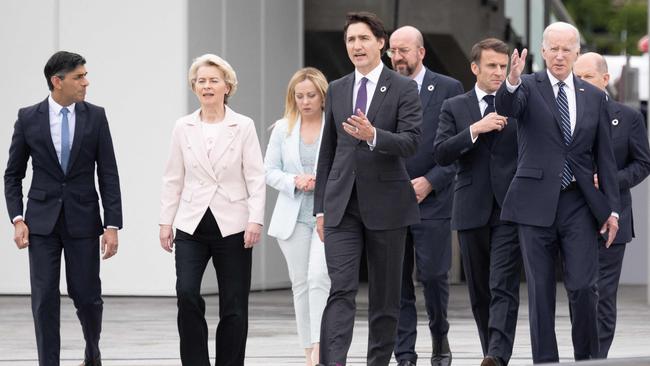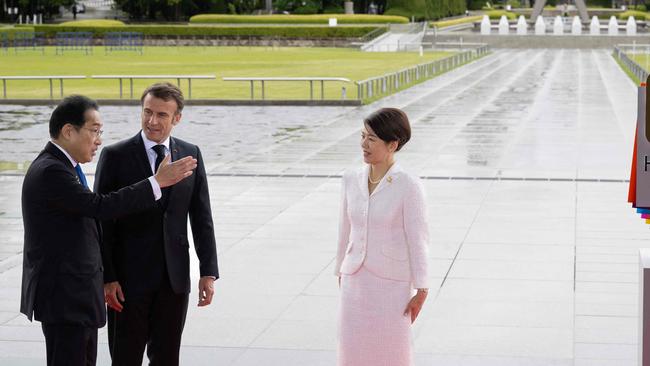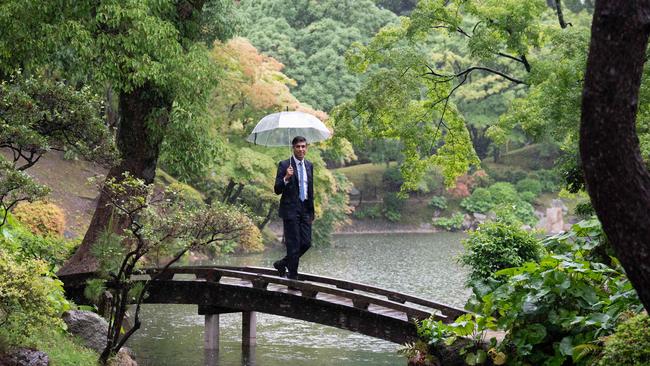‘Diamonds are not forever’: West tightens screws on Russia with more sanctions
Russia’s diamonds and other rich minerals are the latest target of sanctions against the brutal regime.

Russia’s diamonds and other rich minerals are the latest target of sanctions against the brutal regime as the world’s wealthiest democracies attempt to choke Moscow’s ability to fund the war in Ukraine.
The G7 nations are also expected to bring a series of new measures aimed at squeezing Moscow’s access to the international financial system, including adding dozens more Russian and foreign entities to a trade blacklist.
Before a G7 summit in Japan began on Friday, Britain announced it would introduce “a ban on Russian diamonds”, copper, aluminium and nickel, and sanction more entities involved in Moscow’s “military industrial complex”.
Hours later European Council president Charles Michel said the bloc would target the lucrative trade in Russian diamonds, which he joked “are not forever”.
Russia’s diamond trade is estimated to be worth up to $US5bn ($7.5bn) a year.
EU member Belgium is among the largest wholesale buyers of Russian diamonds, along with India and the United Arab Emirates. The US is a major end-market for the finished product.
Britain’s foreign office said the UK’s new sanctions would freeze the assets of 86 people and organisations, including “companies connected to theft of Ukrainian grain, and those involved in shipment of Russian energy”.
The new sanctions will also target “advanced military technology and remaining revenue sources”.

The US measures will put 70 more Russian and foreign entities on a trade blacklist.
British Prime Minister Rishi Sunak said on Friday that his “straightforward” message for Russian President Vladimir Putin was: “We’re not going away.”
“One of the topics of conversation I’ll be having and have been having with my fellow leaders is about the longer term security agreements … for Ukraine to deter future Russian aggression,” he said.
The G7 leaders are gathered in Hiroshima for three days, where they will also discuss how to respond to China’s growing military and economic power.
Washington got the ball rolling early on Friday, with a senior US administration official promising “a significant effort that will extensively restrict Russia’s access to goods that matter for its battlefield capabilities”.
“It will cut off roughly 70 entities from Russia and other countries from receiving US exports by adding them to the commerce blacklist. And there will be upwards of 300 new sanctions against individuals, entities, vessels and aircraft,” the official said.
The bloc wants to disrupt Russian war supplies, close evasion loopholes and further reduce reliance on Russian energy, he said.
One EU official said Indian co-operation would be crucial to making any new measures work. India accounts for a large portion of the world’s trade in rough diamonds.

There will be a chance for G7 leaders to make their case directly to Indian Prime Minister Narendra Modi, whose country has close military ties with Russia and has so far declined to condemn Moscow’s invasion.
Mr Modi, who will visit Australia next week, is among several leaders, including Anthony Albanese, from major developing economies invited to the summit as the bloc tries to win over sceptical nations to its way of thinking on both Moscow’s war and China’s increasing sway.
Ukrainian President Volodymyr Zelensky will address the summit in person.
The surprise trip will be his first to Asia since the war began and would allow him to meet key allies such as US President Joe Biden.
In a moment heavy with symbolism, the leaders arrived at Hiroshima’s Peace Park to a sodden red carpet welcome from Prime Minister Fumio Kishida.
The Japanese leader, who is from the city, wants to put disarmament on the agenda during the talks.
Mr Kishida once guided US president Barack Obama in the city during his historic visit, and has said achieving a world free of nuclear weapons is his life’s work.
The leaders began their visit with a stop at the Hiroshima Peace Museum, which contains graphic evidence of the devastation and suffering caused by the US nuclear attack on August 6, 1945.
Media were barred from the museum amid speculation about whether the leaders would visit only the building’s east wing, which describes the dangers of nuclear war, or also pass through the main building, which contains upsetting photos of victims with horrific injuries.
Japan’s foreign ministry said the leaders’ visit “deepened their understanding of the reality of the atomic bombings”.
AFP



To join the conversation, please log in. Don't have an account? Register
Join the conversation, you are commenting as Logout